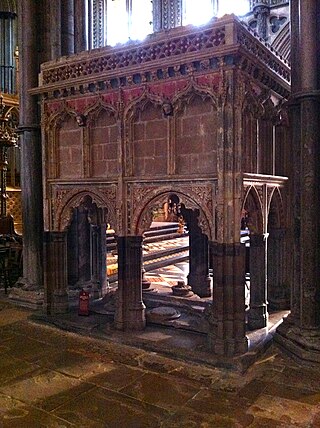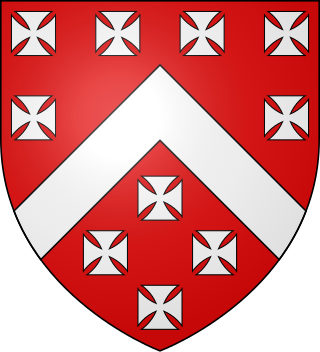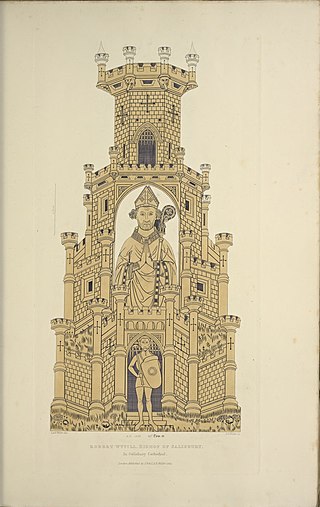Related Research Articles
Walter Reynolds was Bishop of Worcester and then Archbishop of Canterbury (1313–1327) as well as Lord High Treasurer and Lord Chancellor.
Simon de Langham was an English clergyman who was Archbishop of Canterbury and a cardinal.
Thomas Charlton was Bishop of Hereford, Lord High Treasurer of England, Lord Privy Seal, and Lord Chancellor of Ireland. He is buried in Hereford Cathedral in Hereford, Herefordshire, England.
Marmaduke Lumley was an English priest, Bishop of Carlisle from 1429 to 1450, and Knight Commander of the Order of St. John of Jerusalem. He was a son of Ralph de Lumley, 1st Baron Lumley and Eleanor de Neville. He was elected about 5 December 1429, and consecrated on 16 April 1430. He was Bishop of Lincoln for a short time before his death in December 1450. He was educated at University of Cambridge and was appointed Precentor of Lincoln Cathedral in 1425. He also became Chancellor of the University of Cambridge in 1427 and was Master of Trinity Hall, Cambridge from 1429 to 1443. From 1446 to 1449 he served as Lord High Treasurer of England. Lumley's tenure as Lord High Treasurer occurred during the Great Bullion Famine and the Great Slump in England.
Nicholas Close was an English priest.
John Chishull or John de Chishull was Lord Chancellor of England, Bishop of London, and Lord High Treasurer during the 13th century. He also served as Dean of St Paul's.
John Langton was a chancellor of England and Bishop of Chichester.
Thomas Cobham was an English churchman, who was Archbishop-elect of Canterbury in 1313 and later Bishop of Worcester from 1317 to 1327.
Robert Baldock was the Lord Privy Seal and Lord Chancellor of England, during the reign of King Edward II of England.
Adam Orleton was an English churchman and royal administrator.

John Hotham was a medieval Chancellor of the Exchequer, Lord High Treasurer, Lord Chancellor and Bishop of Ely. He was also the effective Governor of Ireland for a time.

James Berkeley was Bishop of Exeter for a period of three months in 1327, a term of office cut short by his death.
Richard de Wentworth was a medieval Bishop of London.
William Ayermin was a medieval Bishop of Norwich.
Thomas Hemenhale was a medieval Bishop of Norwich-elect and then Bishop of Worcester.
John Wakering was a medieval Bishop of Norwich.

Robert Wyvil was a medieval Bishop of Salisbury.
John Sandale was a Gascon medieval Lord High Treasurer, Lord Chancellor and Bishop of Winchester.
John St German was a medieval Bishop of Worcester-elect. He was elected on 25 March 1302 but his election was quashed on 17 October 1302 before he was consecrated.
Wulstan Bransford was a medieval Bishop of Worcester.
References
- Fryde, E. B.; Greenway, D. E.; Porter, S.; Roy, I. (1996). Handbook of British Chronology (Third revised ed.). Cambridge: Cambridge University Press. ISBN 0-521-56350-X.